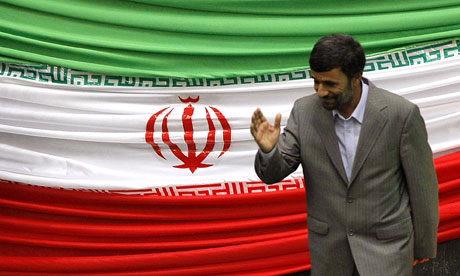WikiLeaks: the latest developments
Iran's president 'slapped' by the head of the revolutionary guard, a German CEO blasts French industrial espionage and the latest on WikiLeaks

Mahmoud Ahmadinejad leaves the podium after being sworn back in as Iranian president on 5 August 2009. Photograph: Behrouz Mehri/AFP/Getty Images
Today we are beginning a rolling update of Wikileaks coverage, and the coverage of the coverage.
• Spain's El País was blocked in Iran following its publication of a cable that said Mahmoud Ahmadinejad was reportedly slapped by the head of the revolutionary guard. The exchange, a protected source told US diplomats, came when the Iranian president took what it calls a "surprisingly liberal posture" in a January 2010 meeting to discuss the next steps on dealing with the opposition protests. Ahmadinejad suggested more personal and social freedoms, including freedom of the press, in order to help diffuse the situation.
According to source, Ahmedinejad's statements infuriated Revolutionary Guard Chief of Staff Mohammed Ali Jafari, who exclaimed "You are wrong! (In fact) it is YOU who created this mess! And now you say give more freedom to the press?!" Source said that Jafari then slapped Ahmedinejad in the face, causing an uproar and an immediate call for a break in the meeting, which was never resumed
• Norway's Aftenposten was leaked the cables last month and has been publishing. One cable revealed that Berry Smutny, the CEO of Germany's leading satellite manufacturer, had told US diplomats he believed France was responsible for more industrial espionage in Germany than either Russia or China.
Smutny frankly said "France is the evil empire stealing technology and Germany knows this", but Germany's decentralized government is not willing to do much about it. Going on at length of his despise of the French, Smutny said French IPR [intellectual property rights] espionage is so bad that the total damage done to the German economy is greater than that inflicted by China or Russia
The meeting was part of a well-documented effort to get the US interested in a proposed German network of reconnaissance satellites, despite strong opposition from France.
The cables have caused a stir, as the Foreign Policy blog puts it, since Germany's BND spy agency said the satellites "would be operated by a 'commercial entity' created specifically for this purpose, but with tasking managed/controlled/coordinated by BND." DLR, Germany's aerospace agency, has denied this is a spy satellite system; it said the purpose was to "transmit data for public services, for example for crisis management in natural catastrophes."
• And - in case you missed it - here is a Newsweek.com gallery of how Julian Assange spent Christmas. Picture 3/11 has him dressed in a red coat with a white fur trim with the caption: "If this is Santa Claus, governments around the world don't want him coming down their chimneys."
Following an executive order from Barack Obama on "a uniform system for classifying, safeguarding, and declassifying national security information", its Office of Management and Budget has sent an 11-page self-assessement to the heads of executive departments and agencies (pdf published by NBC here) covering numerous potential vulnerabilities.
Under the heading "Deter, detect, defend against employee unauthorised disclosures" it gets to the "grumpiness" issue, asking the agency heads if they use psychiatrists and sociologists to measure both "relative happiness as a means to gauge trustworthiness" and "despondence and grumpiness as a means to gauge waning trustworthiness?". Its catch-all term for the vulnerabilities is "insider threat".
A senior State Department official said that the WikiLeaks revelations were not the only reason for Cretz's return, noting the frustrations of US-Libyan ties.
"It's a complicated relationship, and WikiLeaks just added to that complication," said the official, who requested anonymity because no announcement has been made on Cretz's status
Anne-Marie Breach, a spokeswoman for Suffolk police, said Assange was told he must adhere to his bail conditions - which were to be at the station at any time between 2 and 5pm daily - and the incident had been reported to Norfolk police (his bail address is in Norfolk). Assange was warned that further action may be taken, which could see him referred to court, if he was late again.
A blockade was imposed on Gaza after Hamas came to power in the territory in July 2007. Israel officials told the US embasssy in Tel Aviv their intention was to keep the Gazan economy functioning at a low level.
Israeli officials have confirmed to Embassy officials on multiple occasions that they intend to keep the Gazan economy functioning at the lowest level possible consistent with avoiding a humanitarian crisis ...
... As part of their overall embargo plan against Gaza, Israeli officials have confirmed to econoffs [US embassy economic officials] on multiple occasions that they intend to keep the Gazan economy on the brink of collapse without quite pushing it over the edge




No comments:
Post a Comment